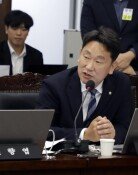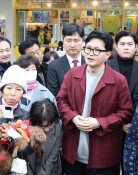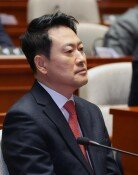Taxpayers Suffering From Budget Spending Decisions
Taxpayers Suffering From Budget Spending Decisions
Posted May. 27, 2005 03:42,
The taxes that individuals and corporations barely manage to pay despite difficult economic conditions are being misspent. When we often see that the public sector makes a conspicuous consumption of taxes, the misperception seems to prevail that government budgets tend to go to those who seize them first.
An economist involved in analyzing the governments budget planning and its efficiency said, Public officials could manage the nation without spending 40 percent of the current budget, if they were told to receive the amount saved.
The construction of 1,185 projects, out of 1,322 cases which 14 public institutions under the umbrella of the Ministry of Construction and Transportation, including the Korea Highway Corporation, have undertaken from 2000 to the end of 2004, and each of which exceed 10 billion won, has been postponed by two years on average for various reasons such as construction plan changes. In the case of the Gyeongbu KTX railway, the expenditure was projected to be 5,800 billion won in June 1990, but increased to 18 trillion won in 1999 through repeated changes in construction plans. Now it is expected to amount to 24 trillion won in 2010, the expected completion date. If private companies operated the way public institutions did, they would have gone bankrupt.
Would you spend like this if thats your money?
In cases of large-scale government-sponsored works having gone through eligibility tests and various evaluations, the greatest amount of losses were incurred by construction stoppages influenced by interest groups such as citizens organizations. There is an assertion that social and economic losses incurred in deferring the second stage of construction of the Gyeongbu KTX railway due to a monks demonstration amounted to 2,500 billion won. The economic loss incurred from deferring the construction of the Sapaesan Tunnels is estimated at 51 billion won. It is evitable that most of losses will be paid for by taxes. The governments inability to adjust conflicting interests is worsening the situation.
The government has injected 11 trillion won into a project to improve the water quality of four major rivers from 1996 until this year, but it turns out that the water quality in the rivers has worsened.
Due to a miscalculation of traffic volume, the government had to allocate more than 100 billion won out of its budget under the name of a subsidy to ensure minimum operating profits to building three roads supported by private capital, including the Incheon International Airport highway. This money also came from taxes.
The case of the social welfare budget, which has significantly increased compared to previous governments, is even worse. About 11.3 billion won out of last years budget allocated for employment stabilization was spent on purchasing a 1,750 pyeong building in Gangnam, Seoul, which means that each employee was given 22.4 pyeong for office space, the average size of a mid-level income bracket apartment.
How big is the unnecessary loss incurred from managing the building? The Board of Audit and Inspection pointed out that most of total budget of 563.4 billion won has made little contribution to stabilizing employment. Instead, the budget money is going to people who manage the welfare system instead of those who need the governments assistance.
In the current budget for transportation of senior citizens, each senior citizen older than 65 years old is given 8,000 to 15,000 won regardless of their income. It is shameful that rich senior citizens who have high income and own a luxurious car are also given the money. Last years budget for transportation of senior citizens was 501.7 billion won. If the money had come from the budget planners own pockets, it would not have been used this way.
There is no serious consideration to setting up priorities in budget expenditures. The first priority should be placed on the sectors that can enhance national competitiveness and enlarge the pie of economic growth. However, the government is pouring its budget money into consumption-focused sectors instead of growth-focused sectors.
Local governments have been eager to have luxurious buildings, but their services have been ignored. The new building for the Yong-in local government worth 180 billion won was given the nickname of the Yong-in Palace. There are many local governments and public institutions constructing luxurious buildings. Their buildings are splendid, but their services have become even worse. The competitiveness of Koreas public sector last year announced by the World Economic Forum (WEF) was ranked in 41st place.
There was an incident where a public official appropriated overtime pay by faking his work records. Appropriating overtime pay, which has been a long-seated custom, can be equated to appropriating taxes. The officials from public and local governments who are supposed to control and supervise budget execution are also conspicuously consuming taxes.
Various private institutions also demand taxes without having appropriate rationales. In 2003, some 40 billion won of the government budget was provided to more than 500 citizens organizations, making it questionable if they would be able to maintain their political neutrality given the governments support. There has also been a case where a private institution has been established only to receive government funds.
Thoughtless government funding for the private sector can distort market order and impede fair competition by weakening self-generation and postponing restructuring. The policies providing the taxes that all people pay for specific industries or corporations in a discriminatory way could also be unconstitutional.
The tax burden on the people has become increasingly heavy due to increases in taxes and the premiums of four compulsory insurances. According to National Assembly Budget Office, nominal GDP increased by eight percent per annum from 1999 to 2003. During the same period, tax income increased by 11.9 percent annually from 94 trillion won to 147.8 trillion won. These increases are the highest among OECD countries, but the government and the Uri Party insist that Koreas tax burden rate is lower than other developed countries.
Due to changes in tax system, individuals, self-employed persons, and corporations are all heavily burdened by rapidly rising taxes. As their incomes have stayed level or have even decreased, the taxes and premiums for the four compulsory insurance policies keep rising. The government should realize that one of the main reasons for distrusting the government lies in peoples tax resistance.
The inefficiency and portliness of public sectors could result not only in government failure, but also the weakening of the private sectors vitality. The government is levying heavy taxes and sub-taxes on corporations and households in order to maintain the inefficiency of the public sector, and is weakening market vitality through unnecessary intervention.
The incumbent government has stopped the privatization of public institutions, often compared to a hippo eating taxes. It is not reform to simply relocate public institutions to local areas. Privatization itself is the core of reforming public institutions.
Complicated Tax System
Transparency in budget planning and the examination process has greatly deteriorated. There happens to be a race among administration, public institutions, assemblies, and local governments in the budget examination process. Sometimes, budgets are spent on the paving of mountain trails where less than ten cars pass a day. If the government perceives taxes as peoples blood and sweat, it would not spend them like this.
President Roh proposed a five percent budget reduction last month. However, he seems to insist that the so-called big government model should be maintained in order to realize balanced regional development and income distribution the incumbent government has supported all along. If the incumbent government really intends to save budget money in order to relieve the peoples burdens, it should decide to freeze expenditures as previous governments did.
The government should undertake a restructuring plan so that it can maximize efficiency with limited resources by readjusting the priorities of projects. The government targets of balanced development, self-reliance of national defense, and balanced diplomacy should be revised in a way that reflects reality more.







